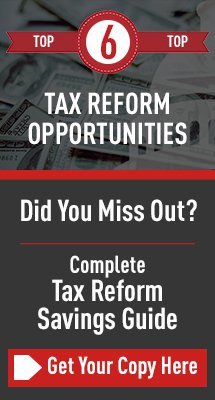 Did you feel like your taxes were minimized last year? If not, it’s possible you may have missed out on some opportunities.
Did you feel like your taxes were minimized last year? If not, it’s possible you may have missed out on some opportunities.
Federal tax reform through the Tax Cuts and Jobs Act provided some of the best tax benefits to businesses in more than 50 years. The corporate tax rate was slashed from the graduated maximum of 35% to a flat 21%.
There also was big news for smaller businesses – the new Qualified Business Income Deduction offers possibly the greatest tax benefit to pass-through businesses in more than 60 years. QBI allows qualified small business owners to simply not pay income taxes on 20% of their qualified income in tax years 2018 through 2025.
While every tax situation is different and savings are not guaranteed, most of the businesses we work with had a good 2018 tax year.
 Did you? If not, download our free Top 6 Tax Reform Opportunities for Business guide. Learn about the latest tax strategies for businesses to see if you could benefit.
Did you? If not, download our free Top 6 Tax Reform Opportunities for Business guide. Learn about the latest tax strategies for businesses to see if you could benefit.
Download the guide now, or check out one of the six strategies below:
Accelerated Depreciation
Section 179 expensing is the immediate expense election that can be made on an asset-by-asset basis. Under tax reform, it’s doubled. The new tax law increased the maximum amount you can take in Section 179 to $1 million as long as you place into service total reinvestments of $2.5 million or less.
For example, let’s say you purchased new equipment in 2018 totaling $2.4 million. You could write off $1 million for a potential tax savings of $296,000.
The act also expands on what’s eligible for Section 179. Not only does it include new and used equipment, but now it includes a new definition called qualified improvement property. Plus it also includes certain investments in the building, like roofs, HVAC units, fire protection systems and alarm systems.
READ MORE: New Guidance on Taking Advantage of Expanded Bonus Depreciation
Bonus Depreciation also improved with tax reform. You can now depreciate 100% of qualifying property, and the good news is that it includes both new and used qualifying assets. For example, say you purchase a new business this year – you’ll be able to even write off the used equipment.
This deduction is similar to Section 179, but the main difference is that you’re required to take this for all the assets that you purchase in a category whose useful life is 20 years or less.
So what does that mean? For example, equipment, signage and décor are all considered 5-year property. Land improvements are considered 15-year property. So unless you make an election out of bonus, you’ll be required to take 100% of the deduction of the assets in that category.
Here’s where tax planning is crucial. You should think about depreciation strategically. Just because you can take all those deductions in one year doesn’t mean you should.
You may want to think about how depreciation impacts your tax situation over time because you could potentially reduce your overall tax burden depending on your situation. Why drive income down to zero in one year and potentially pay tax at the highest tax brackets in the next year?
Want to learn more? Click here to download our complete Top 6 Tax Reform Opportunities for Businesses guide or contact us here.





